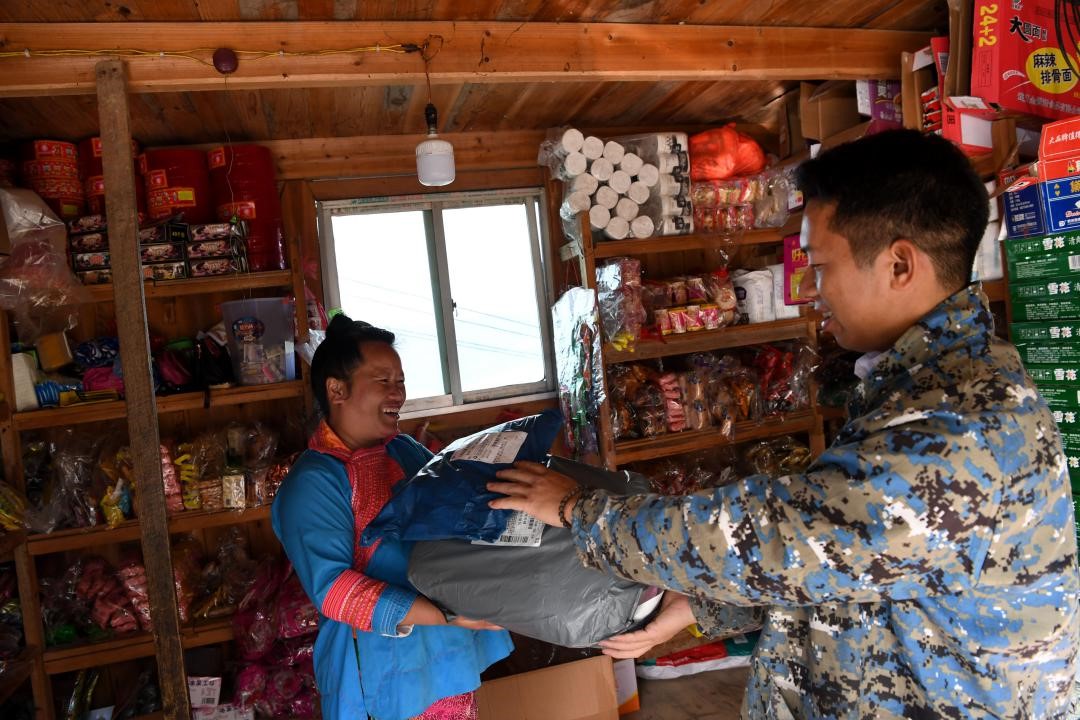

 |
| Pan Fangjian delivers express packages to a villager, Nov. 18, 2020. (People's Daily Online/Wang Bingzhen) |
To ensure the "last mile" logistics in rural areas is of vital importance for developing rural e-commerce.
Last April, China's first smart logistics express project came into service in Huazhou, Maoming of south China's Guangdong province after 6 years of development. The project, which transfers and delivers parcels and joins local poverty alleviation efforts, handled over 3,000 express packages in half a month since its operation, up from 8 on the first day. The growth indicated how smooth logistics can drive rural e-commerce.
The smart logistics express project consists of three base stations, a cable way, shuttle robots, a warehouse and delivery system, and a smart central monitor. Agricultural products loaded on the shuttle robots, such as vegetables, sweet potatoes and pomegranates, can be shipped from village-level base station to the township base station along the cableway, while at the same time, another shuttle robot goes the other way around, carrying express packages received by the township base station to the village.
In the past, villagers had to go to the township to fetch their packages, but thanks to the smart project, today they not only enjoy more convenient logistics services, but find an easier way to ship their agricultural products to the outside.
Once they receive an order on their phones, they can immediately pick the crops and give them to the safe hands of the smart logistics express project, which substantially saves their time and energy.
Logistics is of top priority when it comes to the vitalization of rural economy. Rural logistics networks always come with huge size and heavy cargos, but the unit price, cargo quantity, and shipping frequency are low. Besides, the origins and destinations of the packages are also widely distributed. Out of the consideration for cost, many express companies set agencies only at township level. As a result, express packages were not able to reach villages, and agricultural products of the villages couldn't be sent out, either.
To solve this problem, China's postal service regulator raised a clear requirement in a three-year plan, vowing to cover all administrative villages in the country with express services before the end of 2022.
Based on the smart logistics express project, Maoming has established a three-tier network that covers counties, townships and villages, by which cargos can be delivered within an hour. The new transportation system, which is smart and light and is able to deliver cargos in small volumes and large batches, features low investment, fast construction and low occupation of resources. That's why it can run smoothly in rural areas. In addition, big data, cloud computing and other advanced technologies are also able to make logistics more efficient, so as to make express services more timely, faster, and cheaper.
In the long run, to cover all administrative villages with express services can not only improve the logistics efficiency in rural areas and lower logistics cost, but also promote the in-depth integration between postal services and modern agriculture and rural tourism, so as to contribute to poverty alleviation.
Recently, the general office of the Ministry of Commerce and the general office of the State Post Bureau jointly issued a notice on the promotion of synergetic development of e-commerce and logistics. The notice proposed to coordinate rural enterprises in e-commerce, postal service, express delivery and transportation sectors, encouraging them to enhance cooperation and improve the three-tier delivery system covering counties, townships and villages.
Though logistics demands are huge in rural areas, the government still needs to enhance guidance and promote scientific development to avoid overlapping efforts. Market factors are not able to stimulate the willingness of enterprises, which also might lead to unbalanced investment. The leading role of the government, on the one hand, is able to coordinate efforts and form a synergy; on the other hand, it can also strengthen guarantee and bring modern logistics services to remote areas.
To straighten the "last mile" of rural logistics is a prerequisite for realizing poverty alleviation and rural revitalization. As long as efforts are made to implement policies based on actual conditions, manage matters with science-based principles, and coordinate the whole picture, the rural logistics network will be running efficiently and create a better life for rural people.
 |

 Award-winning photos show poverty reduction achievements in NE China's Jilin province
Award-winning photos show poverty reduction achievements in NE China's Jilin province People dance to greet advent of New Year in Ameiqituo Town, Guizhou
People dance to greet advent of New Year in Ameiqituo Town, Guizhou Fire brigade in Shanghai holds group wedding
Fire brigade in Shanghai holds group wedding Tourists enjoy ice sculptures in Datan Town, north China
Tourists enjoy ice sculptures in Datan Town, north China Sunset scenery of Dayan Pagoda in Xi'an
Sunset scenery of Dayan Pagoda in Xi'an Tourists have fun at scenic spot in Nanlong Town, NW China
Tourists have fun at scenic spot in Nanlong Town, NW China Harbin attracts tourists by making best use of ice in winter
Harbin attracts tourists by making best use of ice in winter In pics: FIS Alpine Ski Women's World Cup Slalom
In pics: FIS Alpine Ski Women's World Cup Slalom Black-necked cranes rest at reservoir in Lhunzhub County, Lhasa
Black-necked cranes rest at reservoir in Lhunzhub County, Lhasa China's FAST telescope will be available to foreign scientists in April
China's FAST telescope will be available to foreign scientists in April